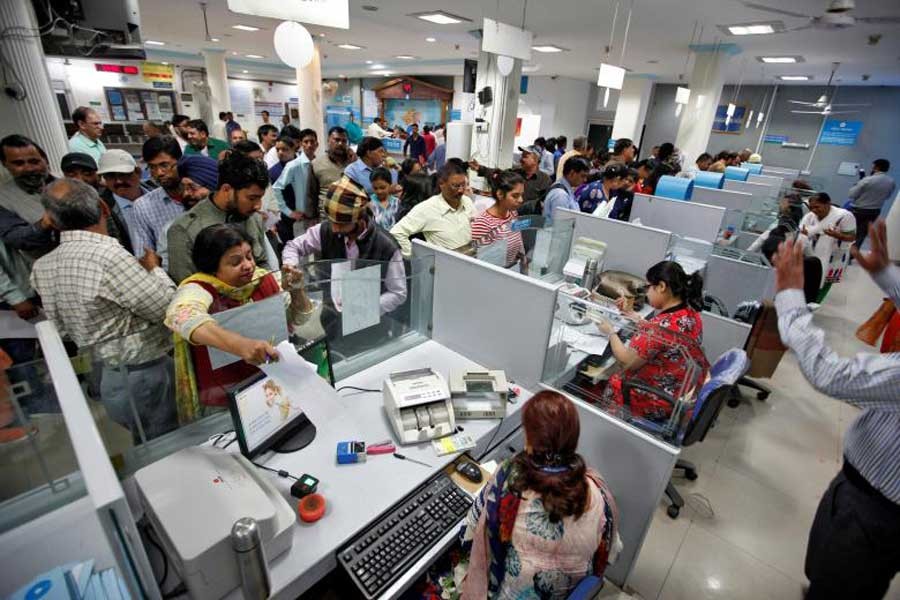Policy and fiscal supports to ease COVID inflicted banking sector woes

Published :
Updated :

It is widely apprehended that the Bangladesh economy is going to be seriously affected by the Covid-19 fallout. The World Bank has already forecast a fall in economic growth to 2-3 per cent in fiscal 2019-2020 and 1.2-2.9 per cent in 2020-21. However, the actual economic losses will depend on how long this pandemic persists and how financial regulators and leaders worldwide devise policies and strategies to address the issue.
Preparations to offset economic effects of Covid-19 are underway in Bangladesh. The government has announced a number of stimulus packages to support industries, financial and farm sectors and vulnerable groups and thus help the economy rebound.
Bangladesh will also face chain effects of this pandemic due to the economy's exposure to the global system. The country's exports, imports and remittances have already fallen and forecast for the next few months is not encouraging either. Inflow of foreign director investment (FDI) into the country is unlikely to rise soon while the government may not get adequate external assistance. Resources mobilisation from both foreign and domestic sources may be difficult.
Suspension of production in many export-oriented industrial units, especially garments, textiles, leather and leather goods, jute yarn and jute goods, shrimp and frozen foods, may trigger unemployment.
Cumulative effects of losses to be incurred by all these sectors would further affect the banking sector, already plagued by huge non-performing loans (NPLs). Apart from investment in the above sectors, the banks have significant investments in the form of loan in fast-moving consumer goods (FMCG), pharmaceuticals, steel, cement, ceramic, power, transport, aviation, telecommunications, software industry, shipbuilding and ship breaking etc.
The banks operating in Bangladesh have also considerable investments in small and medium enterprises (SMEs), cottage and micro enterprises and micro-finance, consumer finance and retail loan segments. All these sectors have already been affected by the Covid-19 crisis and severity of the losses is multiplying with every passing day.
The Bangladesh Bank, as the country's central bank and regulator of banks, has already taken a few policy measures such as revision of CRR (cash-reserve ration) maintenance requirement, re-fixation of Repo interest rate, and extension of usance period for import of industrial raw materials and life-saving drugs, Status quo in classification status of loan and advance and lease till June 30, to address the fallout of the Covid-19 shutdown worldwide.
However, in order to overcome immediate effects of Covid-19 and those in the aftermath of the pandemic, a set of measures could be taken by the banking sector regulator and the country's policymakers. The following recommendations involve both borrowers' and lenders' perspectives, especially in times of economic distress.
n Definition of corporate social responsibility (CSR) applicable for scheduled banks should be revised. Any interest waiver for affected sectors charging lower interest rate, and flexible loan repayment structure including loan documentation deferment of collateral facility should be treated as CSR.
n Interest rate on corporate loans should be reviewed based on the gravity of losses and loan recipients' economic activities, employment generation, contribution to national exchequer and export earnings, and environment-friendly operation towards building green economy. Such revision should be reported to the central bank's relevant department/s for proper monitoring.
n Refinance scheme for SMEs at lower special rate i.e., at lower than bank rate, should be ensured so that scheduled banks lend at 5-7 per cent interest/profit rate.
n Refinance scheme for agricultural loan and micro finance loan should be operated with ultimate interest rate in a range of 5-7 per cent. NGOs and MFIs (microfinance institutions) should be entitled to any central bank refinance scheme directly rather than through scheduled commercial banks. Agricultural loan and micro finance activities of scheduled banks are normally carried out by NGOs and MFIs, not the scheduled banks themselves, only with exceptions, because of high operating cost of such loans.
n Interest rate on credit card loan should be single digit, other than auto loan, as most credit card users are fixed income group people who may not have enough earnings or savings to meet their family needs in time of emergencies like the current crisis.
n Advance-deposit ratio (ADR) may be relaxed and rationalised.
n There should be threshold for distribution of loans among big corporates and SMEs. A well-defined ratio of corporate and SME loans could compel the scheduled banks to maintain fairness in loan disbursement.
n Strict compliance with provision for depositing minimum 50 per cent surplus funds of various government, semi-government, and autonomous bodies and sector corporations with private commercials banks should be ensured to enable their capacity to lend money at lower interest rates among corona-affected entities.
n Corporate tax rate should be downwardly revised in order to enhance the banks' capacity to provide all with loan and other facilities.
n And if possible, VAT (value added tax) on various services (as charged by bank and ultimately paid by borrowers, especially SMEs, micro and agri sector borrowers) should have revised downwardly.
The aforementioned measures, though short-term, would pave a way to ride out the financial crisis. Once the coronavirus pandemic is over and the situation starts improving, such measures and facilities may be revised. Banks should then be allowed to maintain their real asset quality and profitability. In changed circumstances, the government should not struggle in mobilisation of resources.
Md. Asiful Huq is Chief Rating Officer at Credit Rating Information and Services Limited (CRISL).asif.cro94@gmail.com
[Opinion expressed in this article is the author's own and does not necessarily reflect the position of the entity where he works]


 For all latest news, follow The Financial Express Google News channel.
For all latest news, follow The Financial Express Google News channel.